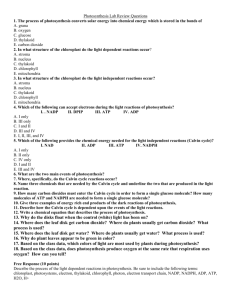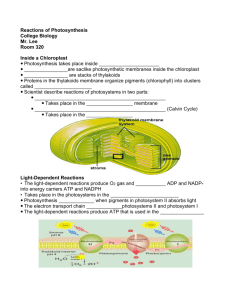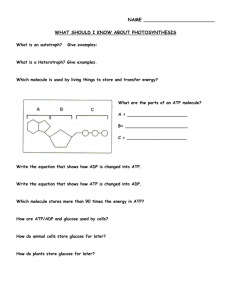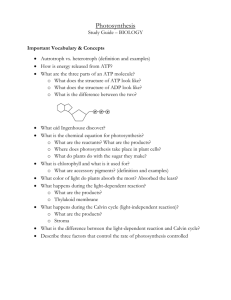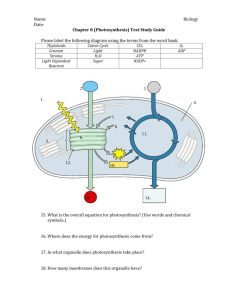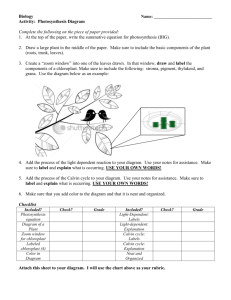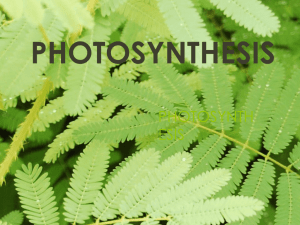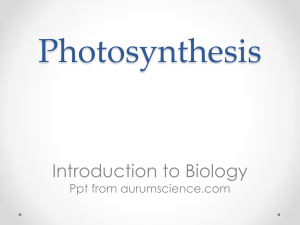Review Sheet Answers/Jeopardy Review
advertisement
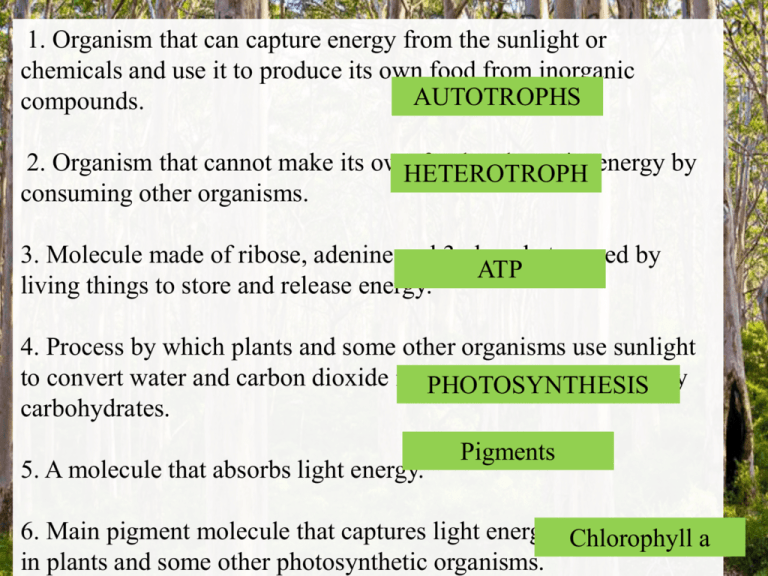
1. Organism that can capture energy from the sunlight or chemicals and use it to produce its own food from inorganic AUTOTROPHS compounds. 2. Organism that cannot make its ownHETEROTROPH food and gets its energy by consuming other organisms. 3. Molecule made of ribose, adenine and 3 phosphates used by ATP living things to store and release energy. 4. Process by which plants and some other organisms use sunlight to convert water and carbon dioxide intoPHOTOSYNTHESIS oxygen and high energy carbohydrates. 5. A molecule that absorbs light energy. Pigments 6. Main pigment molecule that captures light energy which is found Chlorophyll a in plants and some other photosynthetic organisms. 7. Sac-like photosynthetic membrane found in chloroplast. Thylakoid Membrane 8. Cluster of pigments that are the light collecting units in chloroplast. chlorophyll 9. Name one of the three parts that makes up an ATP molecule. Adenine, Ribose or 3 phosphate groups 10. How many phosphate groups are attached to ADP? 2 phosphate groups 11. What is the equation for making ATP from ADP? ADP+P+ENERGY ATP 12. Name the two substances produced by green plants during photosynthesis to stay alive. O2 and C6H12O6 13. Where does the H in the water molecule ultimately end up after the Calvin Cycle? C6H12O6- in the sugar 14. What is the region surrounding the thylakoid membranes inside a chloroplast? Stroma 15. Stack of thylakoid membranes Granum 16. Electron carrier that accepts electrons and an H+ ion that is made in the light dependent reaction and moves it to the Calvin cycle. NADP+ 17. Name the reactant of photosynthesis that use light energy to produce ATP and NADPH and release oxygen. H2O during the Light Dependent Reaction 18. Name the reactant of photosynthesis in which energy from ATP and NADPH is used to build high energy sugar molecules. CO2 during the Calvin Cycle 19. Where does the Calvin cycle take place? Stroma 20. Where does the Light-dependent reaction take place? Thylakoid/granum 21. Another name for the Calvin cycle Light-independent cycle or dark reaction 22. Name the product of the light-dependent reaction. O2, ATP, NADPH 23. Where do the C and O in glucose come from? Co2 24. Which complex absorbs light to start photosynthesis? Chlorophyll in the Thylakoid membrane 25. Name one of the reactants in the light-dependent reaction H2O, ADP, NADP+ 26a. Name one of the reactants of the Calvin cycle. CO2, NADPH, ATP 26b. Name the product of the Calvin cycle. C6H12O6, ADP, NADP+ 27. Name the two reactants of photosynthesis H2O and CO2 28. Where do the H+ ions come from that are added to the NADP+ to make NADPH? The splitting of H2O by sunlight 29. How many molecules of carbon dioxide are used to make 1 molecule of glucose? 6 CO2 30. Which of the following describes this reaction? ADP+P+ energy ATP a) Energy storing A b) Energy releasing 31. Which wavelengths of light are best absorbed by chlorophyll? Blue, Violet 32. Most plants appear green because chlorophyll … a) Reflects green light A b) Absorbs green light 33. Scientist who showed plants produce oxygen when exposed to Ingenhousz light through studying aquatic plants. 34. Scientist who measured the mass of a growing plant and concluded the increase came from water. Van Helmont 35. He experimented with a plant, jar and a candle to show that plants give off something that candles need to burn. Priestley 36. What is the overall balanced equation for photosynthesis- use chemical symbols instead of words. 6H20 + 6CO2 (light) C6H12O6 + 6O2 37. What is the overall balanced equation for photosynthesis- use 6 water + 6 Carbon Dioxide + light= Glucose (sugar) + 6 Oxygen words. 38. The chemical formula CO2 stands for? Carbon Dioxide 39. The chemical formula H2O stands for? Water 40. What is the chemical formula for sugar?(glucose) C6H12O6 41. Name 3 factors that can affect the rate of photosynthesis. Amount of Water, Light intensity, 42. Name the organelle where photosynthesis happens. Temperature Chloroplast 43. What happens to the O in water when it is split during the light dependent reaction? It binds with other Oxygen atoms to create O2 Light-dependent Reaction Location Reactants Products Is Light required? Calvin Cycle
